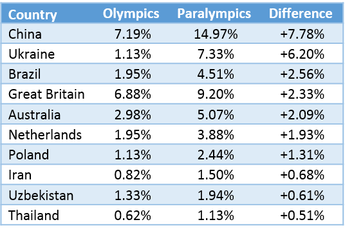Previously on this site, Robbie Butler discussed some potential socioeconomic determinants of success in winning Olympic medals (here) and how the UK’s investment in athletic programs has contributed to increases in medal counts (here). In this post, I examine the differences between countries performances at Olympic and Paralympic games to identify differences in attention and resources devoted to individuals with disabilities relative to others.
Comparing Olympic and Paralympic performances is not so straight forward given that there are many more medals distributed in the Paralympics compared to the Olympics. Since it is more difficult to guarantee a level playing field among individuals with disabilities, a more complex classification of sport events is often required. As such, in Rio 2016, 974 Olympic medals were awarded while 1,597 medals were distributed in the Paralympics. Thus, when comparing the performances of countries it makes sense to consider the share of total medals the country won rather than absolute values.
The Table below reports the top 10 countries measured by the percentage of medals obtained by countries in the Paralympics relative to the Olympics.
| Seven countries are represented in both the top 10 for shares of Olympic medals and Paralympic medals. These countries include USA, China, Great Britain, Australia, Brazil, Italy and Germany. Table 1 shows Ukraine is the country with second largest difference between shares of total medals in the Olympic and Paralympics. While Ukraine finished 29th overall in share of total medals in the Olympics, the country finished 3rd overall in shares of Paralympic medals. The performance of the Ukraine is surprising given its modest population and income per capita relative to its competitors and ongoing war and political turmoil in the country. |
China is the highest ranked country for Paralympic medal wins representing 14.97% of total medals won. This is a 7.78% difference to their share of Olympic medals (7.19%). This could be considered an indication of the country’s progress in increasing standards in social civilization. However, research carried out by Brittain (2006) suggests that rather than being a measure of national social and economic development, success at the Paralympic games is used for political propaganda which the author calls ‘athletes as a means to a political end’.
Research focused on differences between Olympics and Paralympic games is currently underdeveloped particularly when comparing the different determinants of success across the two platforms. As such, researchers are provided with many potential opportunities to fill these knowledge gaps in the future.

 RSS Feed
RSS Feed